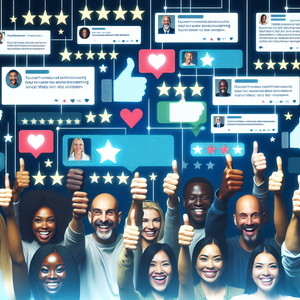The Future of Customer Loyalty with AI Agents

Predictive modeling stands at the forefront of AI's capabilities, enabling businesses to anticipate customer needs and preferences even before they arise. By analyzing historical data, AI agents can identify patterns and trends that inform future customer behavior. For instance, retailers can utilize predictive analytics to forecast which products a customer is likely to purchase based on their previous interactions, browsing history, and purchasing patterns. This proactive approach allows companies to tailor promotions and recommendations, resulting in a more relevant shopping experience that encourages repeat business. *Example:* Major retailers like Amazon are exemplary in their use of predictive modeling. They suggest products based on a customer's past purchases and browsing history, enhancing the shopping experience and increasing conversion rates. Customers are more likely to buy products that align with their interests, leading to increased satisfaction and loyalty.
Personalized Communications
In the current fast-paced digital environment, consumers are bombarded with generic marketing messages that often fail to connect. AI agents can analyze customer data to craft personalized communications that resonate with individual preferences. By segmenting audiences based on behavior, demographics, and past interactions, businesses can deliver targeted messages that drive engagement and foster loyalty. *Example:* Companies like Netflix leverage AI algorithms to analyze viewing habits, allowing them to recommend shows and movies tailored to individual users. This level of personalization keeps customers engaged and reduces the likelihood of churn, as subscribers feel understood and valued.
Innovative Features for Enhanced Engagement
AI agents can introduce innovative features to loyalty programs that significantly enhance customer engagement and satisfaction. For instance, chatbots powered by AI can provide real-time support, answering frequently asked questions and guiding customers through the purchasing process. Furthermore, gamification elements—such as point systems, rewards, and challenges—can be integrated into loyalty programs, making the experience more enjoyable and encouraging customers to participate actively. *Example:* Starbucks has successfully implemented a gamified loyalty program where customers earn stars for every purchase. This system not only incentivizes repeat business but also encourages customers to engage with the app regularly to track their progress and redeem rewards, thus reinforcing customer loyalty.
Data-Driven Insights for Continuous Improvement
AI agents continually analyze customer interactions, providing businesses with valuable insights into customer behavior and preferences. This data-driven approach enables companies to refine their loyalty strategies over time, ensuring they remain relevant and effective. By leveraging AI analytics, businesses can identify which aspects of their loyalty programs drive customer satisfaction and which require improvement. *Example:* Sephora utilizes AI to gather feedback from customers about their shopping experiences, enabling the company to make data-backed adjustments to its loyalty program. This commitment to continuous improvement helps Sephora stay ahead of competitors and maintain a loyal customer base.
The future of customer loyalty is profoundly intertwined with the capabilities of AI agents, which have the potential to revolutionize how businesses interact with their customers. Through predictive modeling, personalized communications, innovative features, and data-driven insights, AI can create a loyalty experience that is both engaging and deeply personalized. As companies embrace the capabilities of AI, they will be better equipped to foster long-term loyalty, enhance customer satisfaction, and ultimately drive business growth. The integration of AI into loyalty programs is not merely a trend; it represents a necessary evolution in the quest for customer loyalty in the digital age. As businesses look to the future, the implementation of AI agents focused on customer retention will become a key strategy. Such agents can deploy personalized email campaigns and targeted offers to reduce churn, creating a proactive approach to customer engagement. By pitching this concept to major companies, one can highlight the growing need for personalized customer experiences and the potential for increased retention rates through AI-driven solutions. As organizations recognize the value of these innovative strategies, the integration of AI agents into loyalty programs will undoubtedly become a staple of successful business models.
AI Customer Experience Strategist
Amazon, Salesforce, Adobe
Responsibilities
Develop and implement AI-driven strategies to enhance customer experiences across digital platforms.
Analyze customer data to identify trends and opportunities for personalization in loyalty programs.
Collaborate with marketing teams to design targeted communications and promotions based on customer insights.
Required Skills
Strong analytical skills with proficiency in data analytics tools such as Python, R, or SQL.
Experience with customer journey mapping and user experience (UX) design.
Familiarity with AI technologies and their application in customer engagement.
Predictive Analytics Specialist
Walmart, Target, Nielsen, McKinsey
Responsibilities
Utilize statistical modeling techniques to forecast customer behavior and preferences.
Work closely with marketing and product teams to inform decision-making with data-driven insights.
Create dashboards and visualizations to communicate findings and recommendations to stakeholders.
Required Skills
Expertise in predictive modeling tools and techniques, including machine learning algorithms.
Proficiency in data visualization software (e.g., Tableau, Power BI).
Strong communication skills to convey complex analyses to non-technical audiences.
Loyalty Program Manager
Marriott, Starbucks, Sephora
Responsibilities
Design and manage customer loyalty programs that integrate AI technologies for enhanced personalization.
Analyze program performance and customer feedback to optimize engagement strategies.
Collaborate with cross-functional teams to implement innovative features and gamification elements.
Required Skills
Experience in loyalty program design and customer engagement strategies.
Strong project management skills and familiarity with CRM systems.
Creative mindset to develop engaging rewards and challenges for customers.
AI Product Manager
Google, Microsoft
Responsibilities
Oversee the development and launch of AI-driven products aimed at improving customer retention and loyalty.
Conduct market research to identify customer needs and preferences for AI solutions.
Coordinate with engineering, design, and marketing teams to align product features with business goals.
Required Skills
Experience in product management, particularly in technology-driven environments.
Understanding of AI technologies and their applications in customer service.
Strong leadership and communication skills to drive cross-functional collaboration.
Data Scientist - Customer Insights
eBay, Accenture, IBM
Responsibilities
Analyze large datasets to extract actionable insights on customer behavior and preferences.
Develop algorithms for segmentation and targeting within loyalty programs.
Collaborate with marketing teams to design experiments and measure the effectiveness of campaigns.
Required Skills
Proficiency in data analysis and machine learning frameworks (e.g., TensorFlow, scikit-learn).
Strong programming skills in languages such as Python or R.
Excellent problem-solving skills with a focus on customer-centric outcomes.


